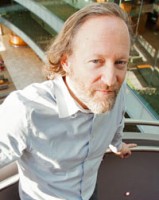Complex Systems: Lectures by David Krakauer, one of '50 people who will change the world,' Oct. 17 and 18
by Michelle Saport |
"The Past, Present and Future of Intelligence on Planet Earth" Thursday, Oct. 17, 7 p.m. Fine Arts Building, Room 150
What is intelligence, where does it come from and why does it appear to be so rare in the known universe? In this talk, David Krakauer will provide an overview of humanity's historical attempts to explain, define and improve our intelligence. He will explore the extraordinary and diverse forms of intelligence across life on earth, and consider the future of intelligence-the extended mind-in an age of increasing dependence upon machines. If the extended mind is the universes' way of understanding itself, what will this cosmological self-awareness produce?
"Evolution, Inference and Learning-The Common Structure of Adaptive Dynamics" Friday, Oct. 18, Noon Rasmuson Hall, Room 101
What exactly is evolution by natural selection? For Darwin, selection provided an explanation for diversity and the surprising fit of the organism to the environment. For the developers of the modern synthesis (Haldane, Fisher, Wright), evolution described the changing frequency of variants under a variety of constraints (epistasis, dominance, etc.) and selection regimes. Recently a small group of theorists (Krakauer included) have come to think of evolution as a special case of a broader class of computational dynamics that includes learning and statistical inference, with metabolic and developmental constraints playing a prominent role in establishing both diversity and complexity. Krakauer will provide an introduction to this new perspective.
About the speaker: David Krakauer is the director of the Wisconsin Institute for Discovery and co-director of the Center for Complex Systems and Collective Computation at University of Wisconsin, Madison. He has a Ph.D. in evolutionary theory from Oxford University. Krakauer's research focuses on the evolutionary history of information processing in biology and culture, including genetic, neural, linguistic and cultural mechanisms. The research spans multiple levels of organization, seeking analogous patterns and principles in genetics, cell biology, microbiology and in organismal behavior and society. In addition to the two Complex Systems Lectures listed, Krakauer will also present a lunchtime talk at the UAA Campus Bookstore Oct. 17.
 "Complex Systems: Lectures by David Krakauer, one of '50 people who will change the
world,' Oct. 17 and 18" is licensed under a Creative Commons Attribution-NonCommercial 4.0 International License.
"Complex Systems: Lectures by David Krakauer, one of '50 people who will change the
world,' Oct. 17 and 18" is licensed under a Creative Commons Attribution-NonCommercial 4.0 International License.










